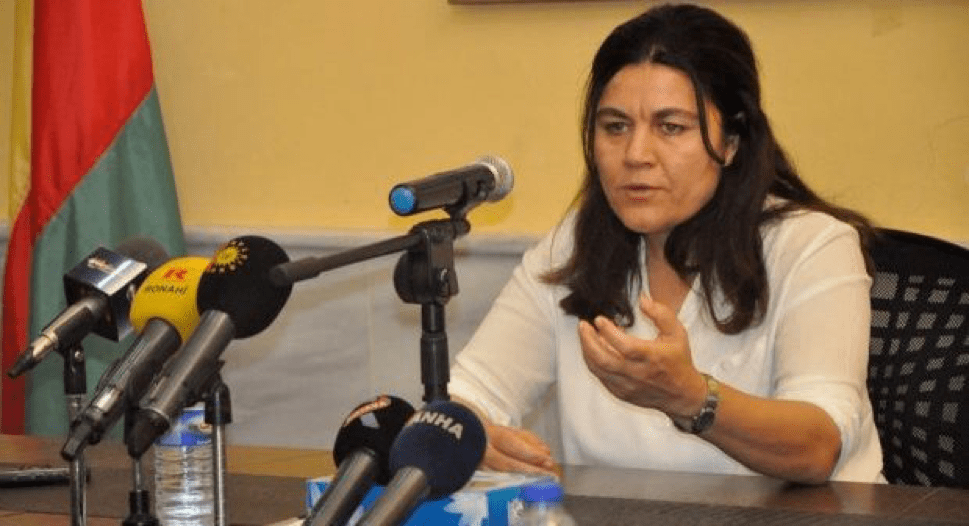Kurdish authorities in Syria ‘dedicated to unity’ as neighboring Iraqi Kurdistan pursues independence
In what was hailed as a milestone in the decades-long […]
10 October 2017
In what was hailed as a milestone in the decades-long struggle for a Kurdish homeland, residents of the autonomous Kurdish region in northern Iraq went to the polls last month and voted overwhelmingly for an independent state.
The Kurdish Regional Government (KRG) there, led by Masoud Barzani’s Kurdistan Democratic Party (KDP), now faces a grueling process of negotiating terms with an Iraqi government that rejects the vote’s legitimacy and has retaliated with border closures and military threats.
But in the de facto autonomous Kurdish-held regions across the border in northern Syria, also referred to as Rojava, local authorities say they have no plans to seek a state of their own.
“We are dedicated to Syria’s unity,” says Fouzah Youssef, one of the highest-ranking officials in the Self-Administration governing Kurdish territories in Syria.
The Self-Administration is dominated by the Kurdish Democratic Union Party (PYD), which shares close ties and an ideology with the Kurdistan Workers’ Party (PKK) in Turkey. Abdullah Ocalan, the jailed leader of the PKK, rejects the traditional concept of a nation-state—like the one Kurds in Iraq just voted for—and instead proposes a federal system in which decision-making power is left to local communities.

“The federal project in Syria does not require independence,” Youssef, who is co-president of the Self Administration’s Executive Committee, tells Syria Direct’s Mohammad Abdulssattar Ibrahim.
What any federal project would inevitably require, however, is negotiation with the Syrian government that maintains control over the majority of the country and continues to operate government institutions within Kurdish territory.
Syrian foreign minister Walid Muallem said in an interview in September that “some kind of autonomy” for Kurdish areas “is open for negotiation.”
Youssef says the Self-Administration is ready to talk, too.
“If the negotiations were for the benefit of our people, then why not?” she says.
Q: How does the Self-Administration’s strategy for Rojava differ from the one being pursued by leaders in Iraqi Kurdistan?
We [in Rojava] believe that we should not depend on concepts of nationality and that a nation-state will not achieve freedom and democracy for our people. [Iraqi Kurdistan’s leaders] insist on their nationalist tendencies.
On the political front, they [in the Kurdistan Regional Government] are relying on connections that harm their relationships with Kurds in other areas of [greater Kurdistan]—this is especially the case with their relationship to Turkey. They put party interests over national interests.
[Ed.: Turkey and the KRG in Iraqi Kurdistan have maintained strong diplomatic and economic ties for years. However, September’s independence referendum—which Turkish President Recep Tayyip Erdogan condemned as “treachery”—strained the relationship.]Q: Can the vision you’ve described be achieved within the existing Syrian state or does it require full autonomy for Rojava?
Independence is one thing and secession is another. Secession does not mean independence if you don’t have the necessary economic, cultural and political self-sufficiency.
The establishment of a federal democratic system in Syria as a whole would achieve, for all constituencies [in the country], the independence to make decisions for one’s own federal regions within a voluntary unit that would provide strength and protection against external attacks.
I don’t see secession as a solution that will serve the Kurds given Syria’s regional and international circumstances. The better solution, in my view, lies in working to develop a federal democratic system across Syria that also guarantees our rights.
We are dedicated to Syria’s unity. The federal project [we envision] in Syria does not require independence.
Q: How do you intend to implement the federal system across Syria while the Assad government remains in power?
Our relationship [with the Syrian regime] is reciprocal. The Self-Administration has political and military power in the region, while we share some matters with the regime due to the presence of Syrian state institutions [within Kurdish-held territory].
We did not eliminate the state’s institutions because we see their necessity, particularly since international organizations recognize the [Syrian] state and its institutions.
There is a difference between dealing with these institutions and [dealing with] the regime.
Q: The Syrian government recently said it is open to negotiations with the Self-Administration regarding autonomy within Syria’s borders. How do you read this statement?
After this statement, the [government made] no practical steps toward a dialogue or translating the statement into reality. So, there is no way to know to what extent it is a strategic decision by Syrian government or a tactic to put pressure on regional states in order to achieve some interim gains.
We want to emphasize that we are overseeing a democratic Syrian project. The first and only choice for stability and coexistence in Syria is negotiation and dialogue. Military means are futile.
Q: Is the Self Administration ready for direct negotiations with the Syrian regime?
We are always for dialogue and peaceful negotiations, even with the regime. If the negotiations were for the benefit of our people, then why not?







